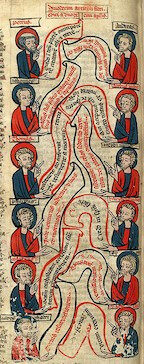What is the Apostles' Creed?

What is the Apostles' Creed? To answer this question, let us first imagine a world, strange and mysterious as it may seem, that does not have any creeds. Welcome to our world. I have a pastor friend who literally told me recently, "My denomination is non-creedal." Which is to say...well, actually I'm not sure what that is to say. Saying your denomination doesn't have creeds is like saying your math doesn't follow any laws. Which is fine, unless you need to count something. Like if all your children are in the car or if one is left behind. I think the child would prefer the creed.
The danger for a non-creedal denomination (or person) is not that it doesn't have any creeds. The danger for a non-creedal denomination is that it doesn't know what its creed is. But it has one. Everyone has one. Everyone has beliefs and doctrines and dogmas. Without this, it would be impossible to act. The danger for a man who is suspicious of creeds is that he doesn't know he is already living by one. He is a creed unto himself. Which is to say, he is a tyrant.
Historically speaking, Anglicanism does have creeds. And the Apostles' Creed is one of our creeds. The Apostles' Creed is a short summary of Christian doctrine. Its shape is trinitarian, which means it begins with the Father, then talks about the Son, and then mentions the Holy Spirit. In the Middle Ages, it was generally believed that the Twelve Apostles each contributed one of the twelve articles of the Apostles' Creed. According to this tradition, the revelation came to the Apostles on the Day of Pentecost itself, while the Apostles were still under the direct inspiration of the Holy Spirit. The image above captures this heritage.
This is a beautiful picture, especially in light of this season of Pentecost. The doctrine articulated in the Creed has always been associated with the work of the Holy Spirit. Jesus often calls the Holy Spirit, "the Spirit of Truth". Needless to say, in our own day, this makes the work of the Spirit in our lives and in our churches a highly controversial thing. Because the Holy Spirit refuses to leave us alone! And he doesn't just work on our hearts, he works on our minds, too. The Holy Spirit desires to transform our whole way of viewing reality. He does so by teaching us true things. The Apostles' Creed is a true thing. A true thing about God. It is deeply rooted in the work of the Holy Spirit in our world, and in our lives.
Which is why, to return to the child left behind by his father's non-creedal math, weask our own babes in Christ to recite it at their baptism. This is an ancient practice. And it fits nicely with the baptismal formula itself, which also follows the trinitarian pattern. In our 1979 Book of Common Prayer, the Creed is recited by the congregation together, in response to questions from the Celebrant. This is to emphasize that there are questions about God to which we actually have the answers.
Ask the child, who has been left behind by his creedless father, "What do you want? And he will tell you, "I want my father. I want not to be lost anymore." Sometimes we forget that the people we are called to serve and love are like this lost child. Except perhaps they don't know they are lost...yet. Leave that part to the Spirit. But when the child is ready for answers, don't give him more questions. When the father realizes his non-creedal folly, don't give him relativism. Give him the Apostles' Creed. He doesn't have to believe it, unless of course he wants to be baptized. Then he does. It is to open hearts like this, that the Holy Spirit sends us in power this Pentecost season, equipped with the Apostles' Creed.


